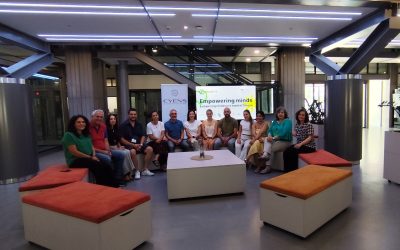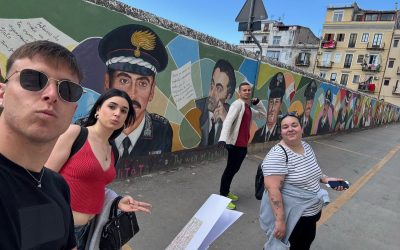In a context in which the war has hit higher education in Ukraine hard, universities around the world have taken action to ensure educational continuity and solidarity: offering accommodation, scholarships and psychological support to students and teachers, collaborating with governments and organizations to keep Ukrainian research and academic dialogue alive.
In this scenario, during the summer we took part in the Summer School “Academic Freedom in Times of War” in Poznań, an immersive training that combined interdisciplinarity, direct testimonies and intercultural exchange to transform knowledge into a concrete defense of academic freedom.
The Adam Mickiewicz University of Poznań hosted this Summer School, organized as part of the European project FreeAc – Promoting Academic Freedom in Ukraine, with the aim of strengthening academic cooperation and promoting democratic values in the European Higher Education Area (EHEA).
The Summer School was attended by students from different partner countries. The intense week, made up of lectures, interactive workshops and group work, offered the opportunity to live a unique experience combining theory and practice. Direct dialogue with academics, academics and NGOs fostered the emergence of lasting bonds and a genuine exchange of perspectives.
Many students underlined how group work was among the most significant moments: it proved to be stimulating opportunities for international collaboration, allowing theoretical knowledge to be applied to concrete projects. The final presentations, which collected reflections on topics such as freedom of research, the autonomy of institutions, the integrity of campuses and freedom of cultural expression, were considered one of the high points of the experience.
The thematic lessons also left a strong impact. Particularly appreciated were the speeches on the indices of academic freedom in the world and the contributions on the risks related to cyber-warfare and the new threats of artificial intelligence to higher education. The multidisciplinary approach, together with the possibility of listening to the direct testimonies of Ukrainian colleagues, has helped to entrench a deep understanding of the current historical moment. Overall, the Poznań experience was highly positive, not only because of the content broadcast but also because of the friendly atmosphere, interactivity and the possibility of building international networks. Many students strongly recommended replicating and expanding similar initiatives, stressing the importance of continuing to promote and defend academic freedom, particularly in support of Ukrainian academia. The Poznań Summer School thus turned out to be not only a training experience, but also a concrete act of academic solidarity. A living and experiential laboratory that strengthened skills, cultural sensitivity and openness of thought. Not a final chapter, but a bridge to future collaborations between universities and European organizations, in defense of a fundamental value: academic freedom in times of war.
About FreeAc
FreeAc – Promoting Academic Freedom in Ukraine is a project funded by the Erasmus + Programme: Key Action 2 – Cooperation partnerships in higher education
Partner
- Universitaet Graz (Austria, coordinator)
- World University Service – Osterreichisches Komitee Verein (Austria)
- International Humanitarian University (Ukraine)
- Sumy State University (Ukraine)
- Taras Shevchenko National University of Kyiv (Ukraine)
- CESIE (Italia)
- KMOP – Education and Innovation Hub (Greece)
- Uniwersytet im. Adama Mickiewicza w Poznaniu (Poland)
For further information
Read about FreeAc or contact Marco Gennaro: marco.gennaro@cesie.org













